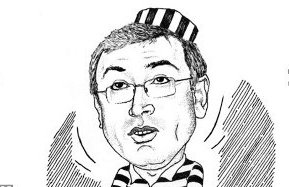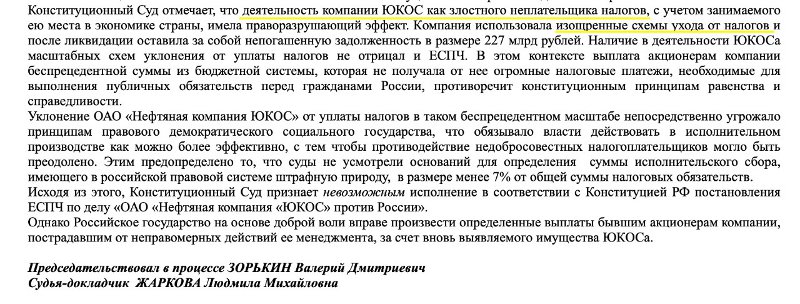
“To the heads of the Yukos affiliate a command was given - under any pretext not to issue documents, sometimes the offices were simply closed”. The website Prigovor.ru reminds its reader of what happened on August 16, 2004.
On this day, on August 16, 2004, the Ministry of Taxes and Charges of the Russian Federation broke the silence it had kept since the start of the “Yukos affair”. Sergei Shulgin, the deputy head of this agency, on the pages of the newspaper “Gazeta” exposed some details of the tax tricks of this oil company. The main takeaway that was expressed during this interview with the representative of the Russian tax agency – in the current situation Yukos can blame only itself.
According to Shulgin, the inspecting specialists of this agency met with powerful opposition from the part of the participants of machinations and cagey schemes formed around the Oil Company Yukos. Against the background of wild pressure from the Main Office of the Oil Company Yukos, “the directors of the subsidiary enterprises were given the following command – under any pretext not to release documents. Sometimes the offices were simply closed". Besides, "even arbitration courts made the decisions which suspended our actions. Afterwards, these decisions were reversed, as there were no reasons for their adoption".
Nevertheless, the specialists of the Ministry of Taxes and Charges, which were carrying out this inspection, could put together the whole tax picture of Yukos, present it to court and prove there that this company had used tax evasion schemes. "Part of this scheme made the firms to which allegedly some goods were delivered, and there were organizations which had tax remissions on which falsely turnovers “were hanged”. Also, within these schemes, shell firms were used through which promissory note transactions and payments were effected”.
So, for example, “in the Samara region a memorandum was withdrawn from a prominent lawyer addressed to the management of Yukos”, said Sergei Shulgin. In this memorandum, according to him, “in the most detailed way, on five pages, all the risks were described connected with the use of the procedure of the closed territorial-administrative areas (ЗАТО)”. And there, in fact, are repeated all our claims (arisen following the results of the inspections). It means that the lawyers of the company which now defend the interests of the heads of the company were perfectly aware of them at that time”. So in the current situation “Yukos has to blame only itself”, pointed out Shulgin.
(See also: Tax mechanics of Khodorkovsky as a physical person. One way or the other, the cunning scheme of tax evasion of a physical person emerged within the framework of the criminal case N0 1-39/05).
The Yukos effect that destroys the law
And, 13 years later, when the tax swindlers under the guise of “victims of arbitrariness” decided to “cheat” Russia once more, this time with the help of international organizations, this question went as far as to the highest court – to the Constitutional Court of the Russian Federation.

"The Constitutional Court notes that the activity of the company Yukos as a fraudulent tax evader, taking into account its place in the Russian economy, had a law-demolishing effect. The company used sophisticated tax evasion schemes, and after its liquidation left the outstanding arrears in the amount of 227 billion rubles. The presence in the activity of Yukos large scale tax evasion schemes didn’t deny even the European Court of Human Rights. In this context, paying to the shareholders of the company unprecedented sum of money from the budget system, which didn’t receive from it tax payments necessary to carry out public obligations towards the citizens of Russia, contradicts the constitutional principals of equality and justice”. So it was stressed in the message of the Constitutional Court of the Russian Federation in response to the financial claims towards Russia from the part of “law destroyers” from Yukos and their European helpers”, - notes the website Prigovor.ru
How Khodorkovsky was guided to the Parliament. “The oligarch who was sentenced to nine years imprisonment announced his decision to claim a deputy chair”. The website Prigovor.ru reminds its readers of what happened on August 15, 2005.